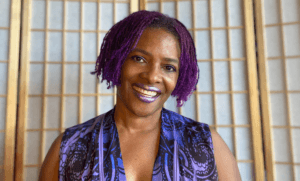by Raina Jackson, Founder & CEO of PURPLE RAINA Self Care
Member of NCIA’s Diversity, Equity, & Inclusion Committee (DEIC)
This past September I had the pleasure of lobbying in D.C. for the first time as part of NCIA’s 10th Annual Lobby Days. The lobbying process was demystified for me, and I found that lobbying isn’t easy, but it isn’t that hard when you share your talking points from your heart, representing your own and others’ experiences. I learned that the NCIA delegation shares more common ground than we realized with Congressmembers, especially through their younger and more hip staffers and family members. One senator has a daughter who used to be a budtender and now podcasts about the industry, Senator Gary Peters (D-MI).
I was encouraged by how receptive legislative aides and advisors were to the factual talking points and statistics NCIA provided us to appeal to their sense of reason and fairness. They recognized the public health and economic benefits cannabis has delivered and its potential, without being distracted by useless moral arguments against it. Our team gave an overview of the cannabis landscape and advocated while offering solutions to our varied struggles as cannabis entrepreneurs.
- We highlighted that 47 states have adopted some form of cannabis commerce and decriminalization, representing 97.7% of the U.S. population! The majority of the American public demands safe access to cannabis. Why not ride the wave?
- Cannabis has been found to be a “gateway” medicine for a more safe withdrawal from opioid addiction, especially crucial to states experiencing high overdose death rates.
- We discussed the DEA recently approved funds for even more substantial clinical research on the myriad of proven and potential health benefits delivered by the cannabis plant in a wide range of forms. Yet existing cannabis research is often more robust and held to higher standards than over the counter aspirin. Many pharmaceutical drugs are advertised on TV as the best thing since sliced bread one day (albeit with alarming potential side effects), then next named in TV ads for class action lawsuits for their harmful effects.
A case for an enhanced SAFE Banking Act
The legal U.S. cannabis market is valued at $17.7 billion, with a substantial amount unbanked, causing a public safety crisis. Our discussions illuminated our common ground regarding the public safety improvements and economic benefits that the bipartisan supported SAFE Banking Act will bring to each state choosing to introduce its own customized hemp CBD/low THC, medical, or adult recreational cannabis program.
- When compliantly banked these funds will offer financial institutions of all sizes more capital for lending to spur economic recovery and a safer industry. While no financial institution will be required to participate, the risk mitigation and sizable financial benefits can’t be ignored.
- SAFE will remove the risk of federal prosecution for compliant financial institutions already offering banking to cannabis businesses, while encouraging more banks and credit unions to join them. Too many existing entities providing cannabis banking services tend to mitigate risk by charging exorbitant monthly fees, financially hobbling startup cannabis businesses or excluding them altogether.
- SAFE would also support hemp CBD businesses like mine, still navigated the grey area regarding access to banking, loans, leases/mortgages, and payment processing.
In my follow-up email to the Congressional aides and advisors we met with, I attached a white paper authored by the Cannabis Regulators of Color Coalition (CCRC) offering best practices for increasing financial access to cannabis businesses, prioritizing groups that have been historically underserved by traditional financial institutions and disproportionately harmed by prohibition.
What’s next?
This regulated cannabis industry is so new that we must allow each other some grace as stakeholders. As cannabis advocates, we have learned that “calling people in” for discussions on the benefits of the SAFE Banking Act and comprehensive cannabis reform is more effective than “calling them out.”
Elected officials and their staff don’t understand first-hand what we experience as cannabis entrepreneurs, and many care more than I expected. Lobbying and sending them emails on new and modified policy recommendations helps them to be well-informed enough to support us. My highlight was meeting with a CA legislative aide who is a fellow CA native and sincerely wanted to be updated on my progress and pain points. We all had a laugh about him agreeing to let me go into “the weeds” concerning the licensing process, pun intended.
Since Lobby Days, President Biden announced the upcoming FDA and DEA review of cannabis as a Schedule 1 drug. It could potentially be de-scheduling within the next 12 to18 months! However, to date, only seven states provide licensing priority, exclusivity, or set aside a percentage of licenses for qualified social equity applicants. The same way the SAFE Banking act should be passed with amendments fostering equity, state, and future federally legalized cannabis programs must include targeted equity programs to help level the playing field. I look forward to returning to D.C. in May for 2023 NCIA Lobby Days!
 Raina Jackson is a multifaceted cannabis brand strategist, product developer, and advocate, and is the founder & CEO of PURPLE RAINA Self Care, the culmination of her love for beauty wellness products, the color purple, and the musical and cultural phenomenon Prince. For the past 7 years she has worked in the San Francisco Bay Area cannabis industry in sales management, field marketing, distribution, and product development, and a verified SF Cannabis Equity applicant in Oakland and San Francisco. For the past year she has served on the NCIA Diversity, Equity, & Inclusion Committee and the Regulatory Compliance subcommittee.
Raina Jackson is a multifaceted cannabis brand strategist, product developer, and advocate, and is the founder & CEO of PURPLE RAINA Self Care, the culmination of her love for beauty wellness products, the color purple, and the musical and cultural phenomenon Prince. For the past 7 years she has worked in the San Francisco Bay Area cannabis industry in sales management, field marketing, distribution, and product development, and a verified SF Cannabis Equity applicant in Oakland and San Francisco. For the past year she has served on the NCIA Diversity, Equity, & Inclusion Committee and the Regulatory Compliance subcommittee.
Raina has over 15 years of experience in beauty/wellness care product development, sales/ marketing management, and product education at Maybelline, L’Oréal Professional, and Design Essentials Salon System and has taught cosmetology at The Aveda Institute in SoHo NYC. A San Francisco native, Raina earned a B.A. degree in cultural anthropology and linguistics from Stanford University and an MBA in marketing and management from NYU.


Follow NCIA
Newsletter
Facebook
Twitter
LinkedIn
Instagram
–